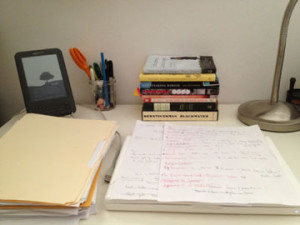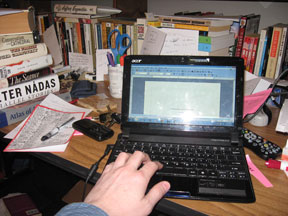 One of the hardest but also the most rewarding things about having a book out [For out of the Heart Proceed] has been getting asked to talk about it. I don’t mean that to sound coy or falsely modest. I think it’s hard to talk about my writing, but it’s also rewarding, because having to do so sends me back into a story or into my memory of writing that story; invariably I learn something new. Likewise, I think it’s difficult to find the right way to talk about other books and about other writers, which is something that’s absolutely central to being able to discuss, say, how I might place short-short fiction in relation to prose poetry on some kind of map of literary genre. This is also really rewarding because it sends me back to books I love, where I get to relearn all over again just why that is. Sometimes these conversations happen in interviews, or in posts like this one, and sometimes it’s just through talking with a friend or a colleague who’s read the book. I’m asked about my influences or about what I was up to in particular stories, and so on. These are good questions, and it’s my job to try to come up with answers that make me seem, well, not dumb. For a guy whose first instinct is almost always to answer “I don’t know” that’s no small task.
One of the hardest but also the most rewarding things about having a book out [For out of the Heart Proceed] has been getting asked to talk about it. I don’t mean that to sound coy or falsely modest. I think it’s hard to talk about my writing, but it’s also rewarding, because having to do so sends me back into a story or into my memory of writing that story; invariably I learn something new. Likewise, I think it’s difficult to find the right way to talk about other books and about other writers, which is something that’s absolutely central to being able to discuss, say, how I might place short-short fiction in relation to prose poetry on some kind of map of literary genre. This is also really rewarding because it sends me back to books I love, where I get to relearn all over again just why that is. Sometimes these conversations happen in interviews, or in posts like this one, and sometimes it’s just through talking with a friend or a colleague who’s read the book. I’m asked about my influences or about what I was up to in particular stories, and so on. These are good questions, and it’s my job to try to come up with answers that make me seem, well, not dumb. For a guy whose first instinct is almost always to answer “I don’t know” that’s no small task.
Here’s an example: the title of my book is taken from a verse in the Book of Matthew that, as I read it, is about how we demonstrate who we are by our actions. Alan Heathcock puts it better in his book Volt, which is there in the stack on my desk. “We are what we do,” a character tells his son in the story “Smoke.” I like this idea and I like this sentiment. I think it’s true. Anyway, in an interview recently, I was asked to talk about this in relation to some of the characters in my book, about how thematically the title represents something cohesive about the collection as a whole. And that’s no easy question. Because of course part of the answer really is I don’t know. Or at least I didn’t know when I was writing the stories. So I had to go figure it out. To answer a question in an interview like this is an act of reflection, of revising intent, of analysis.




